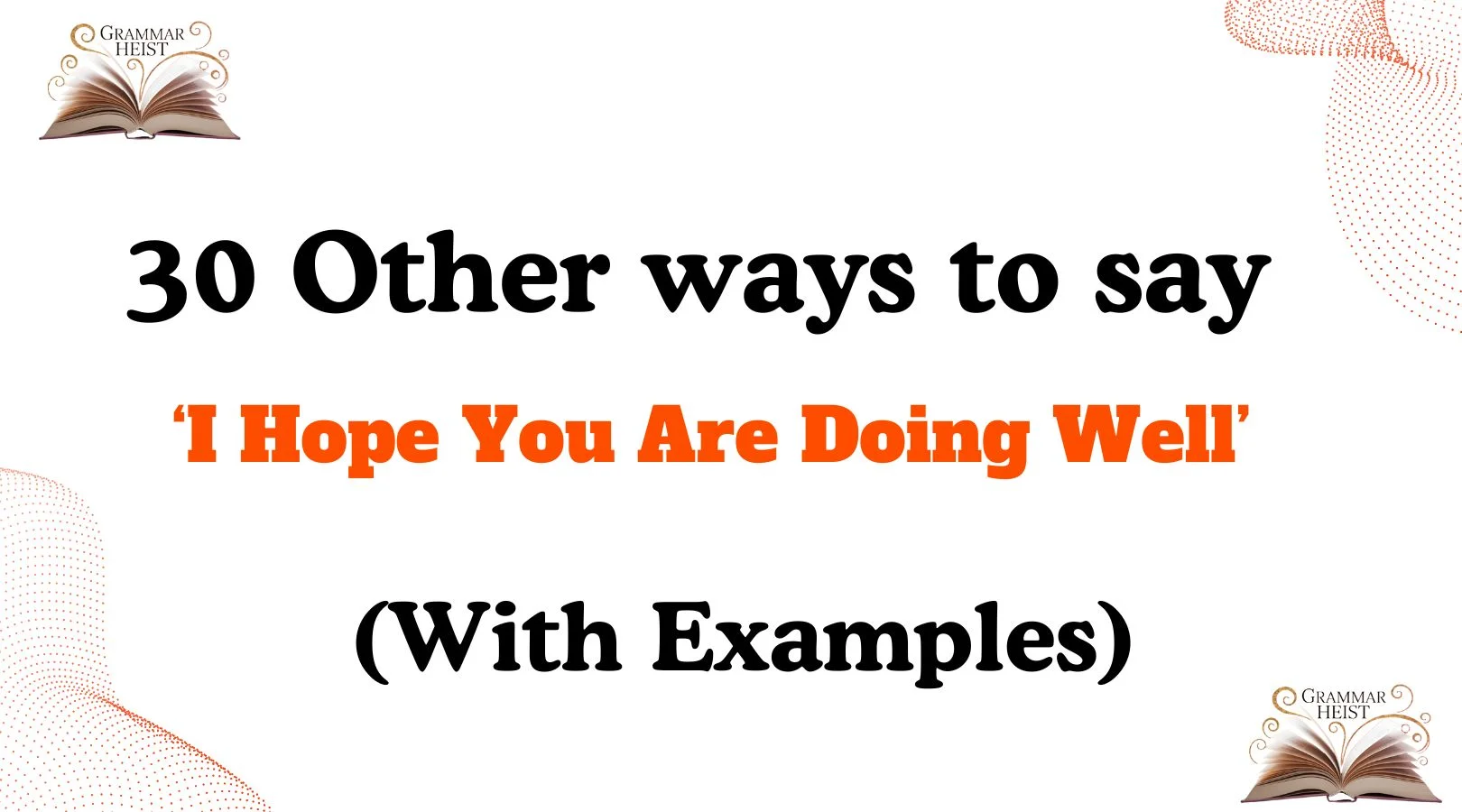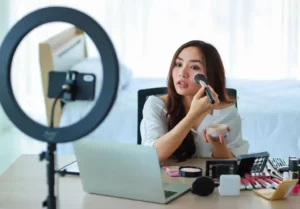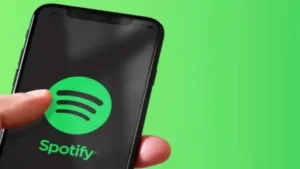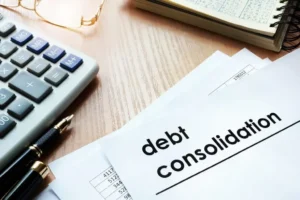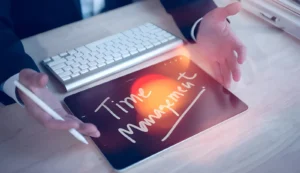When writing an email, message, or letter, we often use the phrase “I hope you are doing well.” It’s a polite and thoughtful way to begin, but because it’s so common, it can sometimes feel overused or generic. Finding other ways to say “I hope you are doing well” can help you sound more genuine, warm, and personal, whether you’re writing to a friend, colleague, client, or loved one.
In this article, you’ll discover 30 alternatives to “I hope you are doing well” with examples, scenarios, and tips on how to use them naturally. These phrases will make your communication more authentic, caring, and memorable.
What Does “I Hope You Are Doing Well” Mean?
The phrase “I hope you are doing well” is a polite way to show care and concern for someone’s health, happiness, or general well-being. It’s often used at the start of professional emails and personal messages to add a friendly touch before moving into the main content.
It’s essentially a universal greeting that expresses thoughtfulness, but it doesn’t always sound very personal because it’s used so frequently.
Is It Professional/Polite to Say “I Hope You Are Doing Well”?
Yes, “I hope you are doing well” is both professional and polite. It is widely accepted in business communication, formal writing, and friendly conversations. However, using alternatives can help you stand out, make your message sound more personal, and avoid repeating the same phrase too often.
Pros or Cons of Saying “I Hope You Are Doing Well”
Pros:
- Polite and respectful
- Works in both professional and casual settings
- Universally understood
Cons:
- Overused and predictable
- May sound generic or impersonal
- Can feel like a filler phrase
Synonyms For “I Hope You Are Doing Well”
- I hope this message finds you well
- I trust you are doing well
- I hope you’re having a good day
- I hope you’re doing great
- I trust you’re keeping well
- I hope life is treating you kindly
- I hope you’re having a wonderful week
- I trust things are going well for you
- I hope you’re in good health
- I hope your day is going well
- I hope all is well with you
- I trust you’re doing fine
- I hope you’re enjoying your week
- I hope you’re having a pleasant day
- I trust everything is going smoothly
- I hope your week is off to a great start
- I trust you’re having a productive day
- I hope things are going well for you
- I hope everything is fine on your end
- I trust you’re keeping safe
- I hope you’re in high spirits
- I hope you’re feeling good today
- I hope everything is going great for you
- I trust you’re doing okay
- I hope you’re feeling well today
- I hope your morning is going well
- I trust you’re having a good week
- I hope everything is wonderful with you
- I trust you’re well
- I hope all is good with you
1. I hope this message finds you well
Scenario: Great for professional emails and formal communication.
Examples:
- I hope this message finds you well and in good spirits.
- I trust this note finds you doing well today.
- I hope this email finds you in good health.
Tone: Polite, respectful, and professional.
Explanation: This phrase is widely used in formal writing. It sounds polished and considerate, making it a strong choice for business communication.
2. I trust you are doing well
Scenario: Suitable for formal emails, clients, or business introductions.
Examples:
- I trust you are doing well this week.
- I trust you and your family are keeping safe.
- I trust everything is going smoothly on your end.
Tone: Professional and confident.
Explanation: This phrase expresses trust and goodwill. It shows you assume the recipient is fine, which adds a positive, respectful touch.
3. I hope you’re having a good day
Scenario: Casual yet polite; perfect for friendly or semi-professional notes.
Examples:
- I hope you’re having a good day so far.
- I hope your day is off to a great start.
- I hope you’re enjoying your day today.
Tone: Friendly, approachable, and warm.
Explanation: This phrase feels light and conversational. It works well when you want to keep communication personal without being too formal.
4. I hope you’re doing great
Scenario: Perfect for casual emails, texts, or semi-professional conversations.
Examples:
- I hope you’re doing great today.
- I hope everything is going great on your side.
- I hope you’re doing great and enjoying your week.
Tone: Positive, uplifting, and friendly.
Explanation: This phrase adds an extra level of enthusiasm compared to “doing well.” It conveys optimism and warmth.
5. I trust you’re keeping well
Scenario: Ideal for professional and international correspondence.
Examples:
- I trust you’re keeping well and staying healthy.
- I trust you’re keeping well during these times.
- I trust you’re keeping well and safe.
Tone: Formal yet caring.
Explanation: This version blends professionalism with concern for the recipient’s well-being, often used in formal emails.
6. I hope life is treating you kindly
Scenario: Best for personal notes, friendly chats, or supportive emails.
Examples:
- I hope life is treating you kindly these days.
- I hope life is treating you kindly at work and home.
- I hope life is treating you kindly and with joy.
Tone: Warm, empathetic, and thoughtful.
Explanation: This phrase feels deeper and more personal, showing genuine care for someone’s situation and overall well-being.
7. I hope you’re having a wonderful week
Scenario: Great for weekly check-ins, both professional and personal.
Examples:
- I hope you’re having a wonderful week so far.
- I hope your week is going wonderfully.
- I hope this week has been good to you.
Tone: Cheerful and encouraging.
Explanation: This phrase focuses on the week itself, making it more time-specific and lively compared to the generic “doing well.”
8. I trust things are going well for you
Scenario: Suitable for professional messages with a polite and respectful tone.
Examples:
- I trust things are going well for you and your team.
- I trust things are going well with your new project.
- I trust things are going well on your side.
Tone: Respectful, confident, and professional.
Explanation: This phrase expresses trust in the recipient’s success or well-being without sounding intrusive.
9. I hope you’re in good health
Scenario: Excellent for formal emails or when health is a concern.
Examples:
- I hope you’re in good health and spirits.
- I hope this finds you in good health today.
- I hope you’re enjoying good health lately.
Tone: Caring, formal, and considerate.
Explanation: This phrase is especially thoughtful when health matters are relevant, showing genuine concern.
10. I hope your day is going well
Scenario: Casual, modern, and suitable for quick check-ins.
Examples:
- I hope your day is going well so far.
- I hope your day is going well and productive.
- I hope your day is going well and enjoyable.
Tone: Light, conversational, and friendly.
Explanation: This option keeps the tone approachable while still being polite, perfect for personal or work-related chats.
11. I hope all is well with you
Scenario: Common and polite, fits both professional and casual emails.
Examples:
- I hope all is well with you and your family.
- I hope all is well with you these days.
- I hope all is well with you and your work projects.
Tone: Neutral, polite, and considerate.
Explanation: A safe and flexible phrase that works in nearly all contexts without sounding too formal.
12. I trust you’re doing fine
Scenario: Best for professional emails or quick follow-ups.
Examples:
- I trust you’re doing fine today.
- I trust you’re doing fine and enjoying your work.
- I trust you’re doing fine this week.
Tone: Professional and straightforward.
Explanation: This phrase is brief and polite, maintaining professionalism without being overly personal.
13. I hope you’re enjoying your week
Scenario: Friendly and positive, useful for casual or semi-formal communication.
Examples:
- I hope you’re enjoying your week so far.
- I hope you’re enjoying your week at work.
- I hope you’re enjoying your week with family.
Tone: Cheerful and uplifting.
Explanation: By focusing on enjoyment, it adds positivity and encourages a lighthearted tone.
14. I hope you’re having a pleasant day
Scenario: Works well in formal or polite correspondence.
Examples:
- I hope you’re having a pleasant day at the office.
- I hope you’re having a pleasant and calm day.
- I hope you’re having a pleasant day so far.
Tone: Respectful, polite, and kind.
Explanation: This version sounds thoughtful and courteous, often used when you want to remain professional yet warm.
15. I trust everything is going smoothly
Scenario: Great for work-related communication, especially on projects.
Examples:
- I trust everything is going smoothly with your new task.
- I trust everything is going smoothly on your side.
- I trust everything is going smoothly with the team.
Tone: Confident and encouraging.
Explanation: This phrase conveys optimism about the recipient’s progress and success, making it ideal for professional settings.
16. I hope your week is off to a great start
Scenario: Perfect for Monday or early-week emails.
Examples:
- I hope your week is off to a great start so far.
- I hope your week is off to a great start at work.
- I hope your week is off to a great start with positive energy.
Tone: Optimistic and friendly.
Explanation: By focusing on the beginning of the week, this phrase feels motivating and engaging.
17. I trust you’re having a productive day
Scenario: Ideal for professional or business contexts.
Examples:
- I trust you’re having a productive day so far.
- I trust you’re having a productive day at the office.
- I trust you’re having a productive day working on your goals.
Tone: Professional, respectful, and supportive.
Explanation: This option emphasizes productivity, showing concern for the recipient’s work and time.
18. I hope things are going well for you
Scenario: Suitable for both professional and personal notes.
Examples:
- I hope things are going well for you these days.
- I hope things are going well for you and your family.
- I hope things are going well for you at work.
Tone: Friendly and adaptable.
Explanation: A versatile phrase that’s polite, caring, and works in nearly all settings.
19. I hope everything is fine on your end
Scenario: Often used in email communication.
Examples:
- I hope everything is fine on your end.
- I hope everything is fine on your end regarding the project.
- I hope everything is fine on your end and running smoothly.
Tone: Neutral and considerate.
Explanation: This phrase works when checking in on progress or conditions, making it especially common in business communication.
Read More:30 Other Ways to Say ‘This Quote Shows’ (With Examples)
20. I trust you’re keeping safe
Scenario: Especially relevant in times of uncertainty or health concerns.
Examples:
- I trust you’re keeping safe during these times.
- I trust you’re keeping safe and well.
- I trust you’re keeping safe at work and at home.
Tone: Caring and thoughtful.
Explanation: This phrase shows genuine concern for the recipient’s safety, making it personal and empathetic.
21. I hope you’re in high spirits
Scenario: Best for uplifting and friendly messages.
Examples:
- I hope you’re in high spirits today.
- I hope you’re in high spirits and enjoying your week.
- I hope this message finds you in high spirits.
Tone: Motivational and warm.
Explanation: This phrase highlights positivity and joy, going beyond simple well-being to emphasize emotional health.
22. I hope you’re feeling good today
Scenario: Suitable for casual emails, texts, or friendly notes.
Examples:
- I hope you’re feeling good today.
- I hope you’re feeling good about your progress.
- I hope you’re feeling good and energized.
Tone: Lighthearted and caring.
Explanation: This phrase feels casual and approachable, making it a comfortable choice for informal settings.
23. I hope everything is going great for you
Scenario: Works well in semi-professional and casual writing.
Examples:
- I hope everything is going great for you at work.
- I hope everything is going great for you these days.
- I hope everything is going great for you and your family.
Tone: Enthusiastic and friendly.
Explanation: This option communicates positivity and support while still being versatile.
24. I trust you’re doing okay
Scenario: Useful for neutral or gentle check-ins.
Examples:
- I trust you’re doing okay with the new changes.
- I trust you’re doing okay and adjusting well.
- I trust you’re doing okay at work.
Tone: Supportive and calm.
Explanation: This phrase is less formal but still caring, making it good for when you want to sound considerate but relaxed.
25. I hope you’re feeling well today
Scenario: Best for health-related check-ins or caring notes.
Examples:
- I hope you’re feeling well today.
- I hope you’re feeling well and rested.
- I hope you’re feeling well after your trip.
Tone: Caring and compassionate.
Explanation: A simple but warm phrase that shows personal concern for someone’s well-being.
26. I hope your morning is going well
Scenario: Great for early-day greetings in professional or casual contexts.
Examples:
- I hope your morning is going well so far.
- I hope your morning is going well at work.
- I hope your morning is going well and peaceful.
Tone: Fresh, cheerful, and polite.
Explanation: This option is time-specific, making it more personal and timely than a general greeting.
27. I trust you’re having a good week
Scenario: Perfect for mid-week emails or business check-ins.
Examples:
- I trust you’re having a good week so far.
- I trust you’re having a good week with the team.
- I trust you’re having a good week and making progress.
Tone: Professional and friendly.
Explanation: This phrase acknowledges the week’s progress, showing awareness of time while keeping the tone polite.
28. I hope everything is wonderful with you
Scenario: Ideal for friendly and positive communication.
Examples:
- I hope everything is wonderful with you and your loved ones.
- I hope everything is wonderful with you these days.
- I hope everything is wonderful with you and your projects.
Tone: Joyful and kind.
Explanation: A more colorful way to express goodwill, this phrase goes beyond “well” to convey genuine happiness for the recipient.
29. I trust you’re well
Scenario: A classic, short, and professional alternative.
Examples:
- I trust you’re well today.
- I trust you’re well and enjoying your time.
- I trust you’re well and safe.
Tone: Formal and concise.
Explanation: This option is brief but effective, often seen in formal business communication.
30. I hope all is good with you
Scenario: Simple, versatile, and friendly.
Examples:
- I hope all is good with you today.
- I hope all is good with you and your work.
- I hope all is good with you and your family.
Tone: Neutral, casual, and approachable.
Explanation: This phrase is easy-going and adaptable, making it suitable for nearly any context.
Conclusion
Using different ways to say “I hope you are doing well” can make your communication more personal, warm, and engaging. Instead of relying on the same generic phrase, you can choose from these 30 thoughtful alternatives depending on your relationship with the recipient and the context of your message.
Whether you’re writing a professional email, a casual text, or a supportive note, these alternatives will help you express genuine care and create a stronger connection.

Emma Brooke is a passionate advocate for effective communication and language mastery. As a dedicated professional in the field of grammar and writing, Emma brings a wealth of knowledge and expertise to those seeking to improve their linguistic skills. With a focus on clarity, precision, and style, Emma Brooke is committed to helping individuals refine their language use to communicate confidently and effectively.
